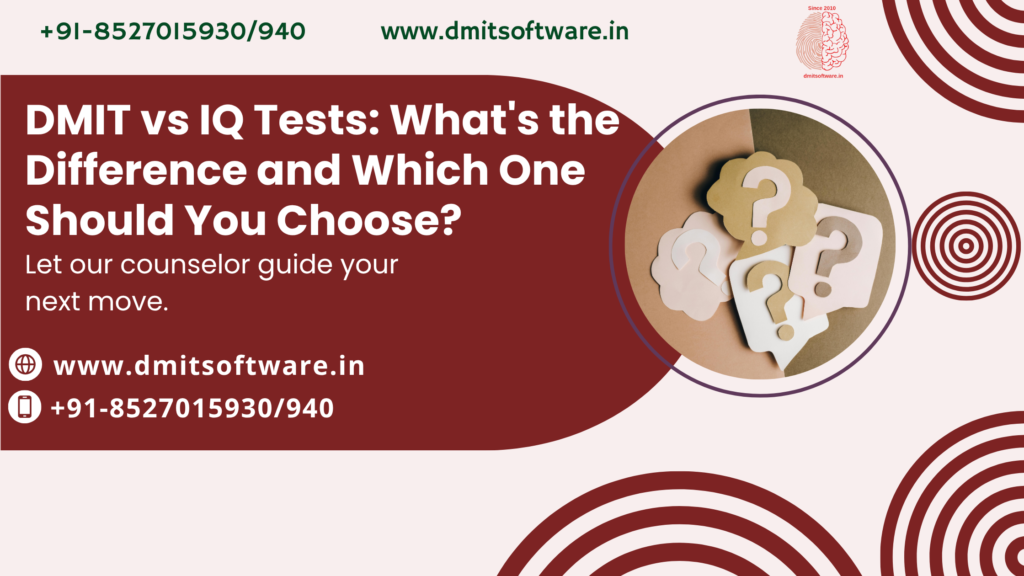DMIT vs IQ Tests: What’s the Difference and Which One Should You Choose?

When it comes to understanding human intelligence, we often find ourselves at a crossroads. Should you rely on a tried-and-true method like an IQ test or explore the potential of advanced techniques such as DMIT? These two paths aim to shed light on an individual’s cognitive ability, but they differ significantly in their approach, methodology, and purpose.
If you’re a parent wondering how to assess your child’s intellectual potential or an individual seeking a deeper self-understanding, this guide will walk you through a clear comparison of DMIT vs IQ tests. By the end, you’ll not only understand the difference between DMIT and IQ tests but also discover which one might be the best fit for your needs.
What is DMIT?
DMIT, or Dermatoglyphics Multiple Intelligence Test, is a scientific analysis of fingerprints that aims to measure multiple intelligences. This test operates on the theory that every individual’s genetic makeup influences the patterns on their fingerprints, which, in turn, provide insights into cognitive strengths and weaknesses.
The term “dermatoglyphics” comes from dermatology (study of skin) and glyphs (patterns). DMIT evaluates the correlation between brain lobes and ridges on fingerprints to provide insights into:
- Learning styles (visual, auditory, or kinesthetic preferences)
- Strengths and weaknesses in different skill areas such as logic, music, athleticism, and emotional intelligence
- Behavioral tendencies and personality traits
- Areas for self-development, like decision-making and problem-solving
DMIT studies multiple aspects of intelligence and offers guidance on life skills and career choices. However, it’s important to note that DMIT findings are interpretive and should be used as a supportive tool, not as a universal metric for intelligence.
Popular Uses of DMIT:
- Career Guidance: Identifying suitable professional fields based on your natural inclinations.
- Child Development: Understanding a child’s innate potential to tailor their education and extracurricular activities.
- Relationship Building: Offering insights into personality dynamics to improve interactions.
What is an IQ Test?
IQ, or Intelligence Quotient, tests are a traditional metric designed to measure cognitive abilities like logical reasoning, problem-solving, and abstract thinking. Unlike DMIT, IQ tests are quantitative assessments focused solely on intellectual performance.
Standard IQ tests typically measure:
- Analytical skills, such as mathematical reasoning and problem solving
- Linguistic ability, including vocabulary and comprehension
- Perceptual reasoning, such as pattern recognition and spatial understanding
- Short-term memory retention
The test results assign an IQ score, which falls on a scale ranging from below average to genius levels of intelligence. IQ tests rely heavily on timed challenges, requiring participants to think quickly and logically.
Popular Uses of IQ Testing:
- Academic Placement: Assessing a student’s ability to excel in academic programs.
- Job Recruitment: Determining critical thinking and reasoning skills for certain professions.
- Therapeutic Diagnosis: Identifying learning disabilities or cognitive delays.
Key Differences Between DMIT and IQ Tests
| Factors | DMIT | IQ Tests |
|---|---|---|
| Focus Area | Measures multiple intelligences, personality, and learning styles | Measures problem-solving ability and logical reasoning |
| Methodology | Fingerprint analysis and cognitive interpretation | Timed challenges using logic, math, and language |
| Nature of Results | Qualitative (focused on insights and suggestions) | Quantitative (outputs an IQ score) |
| Scope | Broad, touching on emotional, creative, and kinesthetic intelligence | Narrow, focused on intellect |
| Age Range | Suitable for all ages (especially children) | Typically for ages 4 and above |
| Primary Use | Personal growth, career guidance, and parenting | Academic placement, talent evaluation, and diagnosis |
Benefits of DMIT
DMIT isn’t just about knowing how intelligent you or your child is; it’s about understanding where that intelligence thrives. Here’s why DMIT is gaining popularity:
- Personalized Insights: DMIT reveals an individual’s ideal learning style, making it easier to adapt educational techniques at an early age.
- Improved Career Choices: It provides a roadmap for identifying natural talents and professional strengths, helping individuals make well-informed career decisions.
- Holistic Understanding: By factoring in emotional intelligence, creativity, and kinesthetic strengths, DMIT offers a well-rounded view of personal abilities.
Benefits of IQ Tests
Long regarded as the standard for measuring intelligence, IQ tests hold several advantages:
- Established Credibility: IQ tests are scientifically validated with decades of research supporting their accuracy.
- Universal Benchmark: The IQ score provides a straightforward way to compare cognitive abilities.
- Diagnostic Tool: These tests are essential for diagnosing learning disabilities or identifying giftedness in children.
DMIT or IQ Test: Which is Better?
Choosing between DMIT and IQ tests depends largely on your goals.
- If You’re a Parent looking to guide your child toward a fulfilling career or if you want to understand their behavioral tendencies, DMIT might be the better choice. It offers a broader understanding of multiple intelligences and personality traits.
- **If You Want Quantifiable Data** about cognitive or problem-solving ability—for example, to qualify for specific academic programs or job opportunities—IQ tests are the way to go.
A combined approach may also work for some scenarios. For instance, parents may use a DMIT test to identify their child’s learning style and an IQ test to assess academic strengths.
Finding the Best Test for You or Your Child
Both DMIT and IQ tests are valuable tools, but their distinct focus areas mean they excel in different contexts. To make the most of either test:
- Understand the Outcome You Want: Is broad personal development the goal, or are you looking for a specific academic measurement?
- Seek Professional Guidance: Whether it’s a certified DMIT analyst or a psychologist administering IQ tests, expert input ensures reliable results.
- Combine Tools If Necessary: For example, start with one test and supplement it with the other to gain a comprehensive understanding.
Unlock the Potential of Intelligence Testing
DMIT and IQ tests are not in competition but rather complementary methods for understanding intelligence. Each serves its unique purpose, whether that’s unlocking untapped potential through DMIT or achieving academic clarity with IQ scores.
If you’re curious about exploring a DMIT test or IQ test to gain deeper insights into intelligence, consider consulting professionals with accredited services in your area. Choosing the right assessment can empower both children and adults to reach their full potential, whether in academics, career paths, or personal development.
Whether you’re a parent seeking the best for your child or an adult aiming to understand yourself better, remember this simple fact: intelligence is about more than one number. It’s about discovering the unique way you or your child learns, grows, and contributes to the world.
